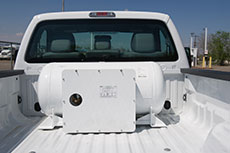Propane Vehicle Conversions
Vehicle conversions help expand the alternative fuel options for fleets. A qualified system retrofitter (QSR) can also reliably convert certain in-service light-, medium-, or heavy-duty vehicles for propane operation. Ford’s Qualified Vehicle Modifier program is an example of a QSR. Conversion systems must be certified as compliant in accordance with U.S. Environmental Protection Agency (EPA) regulations. For more information see EPA's list of Compliant Alternative Fuel Conversion Systems.
Propane vehicle conversions in the United States require EPA certification and/or California Air Resources Board certification, where a QSR should perform the installation. For more information about regulations, codes, and standards, see the Vehicle Conversions page. Note that EPA states the list is not comprehensive.
To learn more about vehicle conversions, see the What Fleets Need to Know About Alternative Fuel Vehicle Conversions, Retrofits, and Repowers report. This report discusses important considerations, “pro tips,” and best practices for converting vehicles to run on alternative fuels, including propane.
The upfront costs to convert fleet vehicles to propane can be offset by reduced operating and maintenance costs over the lifespan of the vehicles and, in some states, through funding or grants. Propane can be a cost-effective option when considering the overall price per mile to operate a propane vehicle.
